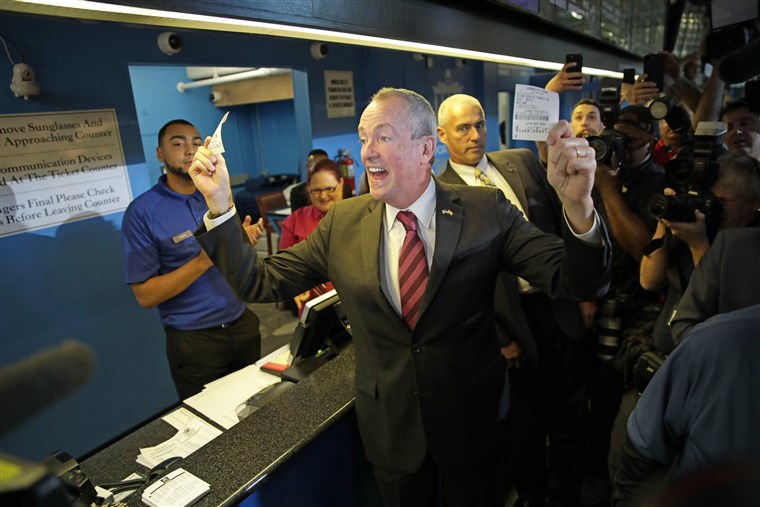
PASPA Gets Overturned in 2018, as Online Poker Players and Pols React
When the Professional and Amateur Sports Protection Act (PASPA) was overturned in May by the US Supreme Court, it opened up new vistas for state-by-state sports betting legalization. It also caused the pot to boil among poker players who had long been clamoring for some kind of official federal weigh-in when it came to online poker.

With the SCOTUS May 2018 overturn of the longstanding PASPA US sportsbetting ban, New Jersey won its case and Gov. Phil Murphy placed the first bet at Monmouth Park racetrack in June. (Image: Dominick Reuter /AFP/ Getty)
But What About Online Poker?
When New Jersey won its long-running battle to overturn PASPA and open the door to intrastate sports betting regulation, it caused a seismic shift across the US. Talking about the change in sports betting with Online Poker Report this year, California Assemblyman Reggie Jones-Sawyer (D-Los Angeles) noted that “sports betting raises all tides.”
And noted professional poker players — never known for keeping their thoughts inside their own heads — used social media for a “what about us?” outcry.
“Every Major sport (NBA, NFL, MLB) is behind the legalization of sports betting, and all of them will profit by it. But how can Sports Betting online be legalized w/out online poker being legalized (clearly more skill than sports betting)? The time is NOW to legalize online poker,” Phil Hellmuth tweeted on May 15.
Hellmuth, like many other Americans, didn’t really understand that the PASPA overturn didn’t actually “legalize” sports betting. It simply removed the obstacles for states to decide for themselves if they wanted to create frameworks for regulated sports books in their own states.
And the Department of Justice 2011 reinterpretation of the 1961 Wire Act — a decision that effectively allowed state-by-state legalization of online poker — had already done exactly that. That DOJ ruling did not overturn the Wire Act itself, of course, which still precludes interstate sports betting. All such action must take place inside a state’s own borders or it runs afoul of the law.
But by removing online poker from its grip, the 2011 Wire Act reinterpretation opened up the option for poker liquidity between states: something sports betting is still precluded from doing.
Aligning with Sports Betting
In line with Hellmuth’s views, the Poker Players Alliance not only rebranded as the Poker Alliance but restructured its organization to reflect the new desire to see sports betting and poker regulated.
“It makes sense for states that are eyeing sports betting to also realize the benefit of regulated iPoker and iGaming,” president Rich Muny wrote in a May 14 press release.
Away from calls for change within the poker industry, Senate Minority Leader Chuck Schumer (D-NY) offered a glimmer of hope on a political stage. Anticipating the surge of interest in sports betting across multiple states, Schumer called for federal regulation.
“With the Supreme Court’s ruling, it’s incumbent on the federal government to take a leadership role and provide the necessary guidance to prevent uncertainty and confusion for the leagues, state governments, consumers and fans alike,” read an August 29 memo to ESPN.
Fusing Sports Betting and Online Poker Regulation
Although Schumer stopped short of stating that online poker should be part of any legal framework, optimists will point towards recent efforts by Republican Senator John Bonacic (R-Mt. Hope). Despite being on his way out of office, the New York politician submitted bill S3898A in the wake of PASPA’s downfall.
Intrinsic in the bill is the push to have sports betting and poker brought under the “skill game” definition. As well as showing that poker and sports can coexist in a single regulatory framework, Bonacic’s efforts inspired Joe Barton (R-TX).
Although the year passed without any formal action, he told RollCall.com in June that he was looking at ways poker regulation could be attached to his horse racing reform bill.
With four states — Nevada, Delaware, New Jersey, and soon Pennsylvania — showing that regulation is not only possible but successful for internet poker, the blueprint has already been written. And there is nothing precluding state-by-state online poker legalization and even interstate player pooling as we head into 2019.
The larger issues have been infighting between commercial entities who might benefit — or lose business — by legalization in major markets like California. And nothing in that arena looks likely to shift in the new year.















0 Comments